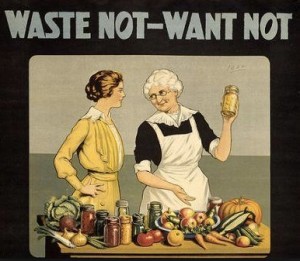Waste Not, Want Not: Recontextualising Waste Prevention by the Irish EPA, EEB, and the EEA
The 18th century proverb, “Waste not, want not,” aptly sums up the issue at play in new Irish EPA (EPA), European Environment Bureau (EEB), and European Environment Agency (EEA) reports on waste prevention. The issue needs all the help it can get, including pithy statements. “Waste prevention,” in practice and policy, is not a sexy issue, it does not grab attention, and has a hard time competing with “climate change” which is an arguably, honest-to-god apocalyptic event.
Last month in the Reports section of irish environment we looked at the European Environment Agency report on Well being and environment which addressed, from an EU perspective, the plans for producing more with less input, with everything getting re-used, recycled or recovered, and re-designed to eliminate wastage. Now we have the Irish EPA and EEB plans for similar action, focusing particularly on waste prevention.
At the core of these various reports is the reality described in a recent UN study, Resilient People, Resilient Planet, where it is estimated that in 20 years we will need 50% more food and 45% more energy, yet we are already running out of our natural resources, and water usage may soon be the source of local and regional conflicts. The planet cannot sustain such exploitation of natural resources. Something has to give.
We used to focus on waste as a disposal problem because of all the adverse environmental impacts from that disposal, whether it was dumping household and industrial waste materials into landfills or incinerators, or from the overflow of municipal wastewater into streams whenever the wastewater treatment plant could not handle the volume. We still have problems with these events, as witnessed by the ongoing investigations and cleanups at the Irish Steel site or the dangerous dumpsite in Derry along the Faughan River, and the pollution of clean bays from recent sewage overflow.
But recently waste prevention has adopted a new set of clothing, a new language. Waste prevention is now more about preserving natural resources and assuring that our generation and those that follow have the natural resources to support a comfortable life style. In other words, it is about resource efficiency, or in the current jargon, a “circular economy.”
A recent conference in Copenhagen on resource efficiency, or waste prevention, was called, “Closing the Loops,” where the focus was on designing materials loops that have no waste, and where valuable waste materials are brought back into the raw materials loop. The circular economy becomes a loop. A conference in Barcelona was entitled, “Beyond Waste Prevention: Towards Circular Economy.” A study of Finnish waste plans talks about the shift in discourse from “waste prevention” to “material efficiency.” In California, they call Extended Producer Responsibility (EPR) “product stewardship.” Scotland talks about zero waste in Scotland’s resource economy.
The focus is on waste as a resource that needs to be managed better, something with which we need to be more efficient, like in the ways we manage our money. If we do not waste it [e.g., food, water, energy], we won’t be without it. If we waste it, our children and grandchildren will want it but not be able to get it.
Sources:
Irish Environmental Protection Agency, Towards a Resource Efficient Ireland (2014). www.epa.ie/pubs/reports/waste/prevention/towardsaresourceefficientireland.html#.U8GSLKiT79c
European Environment Bureau (EEB), Advancing Resource Efficiency in Europe (April 2014). www.eeb.org/EEB/?LinkServID=4E9BB68D-5056-B741-DBCCE36ABD15F02F&showMeta=0
United Nations Secretary-General’s High-Level Panel on Global Sustainability (2012). Resilient people, resilient planet: A future worth choosing. New York: United Nations.
“The European Environment Agency (EEA) on Well Being and Environment,” in the Reports section of irish environment magazine (July 2014). www.irishenvironment.com/reports/european-environment-agency-eea-well-environment/
Pat Lerner, “Resilient People, Resilient Planet: A Mixed Bag,” Greenpeace International (3 February 2012). www.greenpeace.org/international/en/news/Blogs/makingwaves/resilient-people-resilient-planet-a-mixed-bag/blog/38923/
“Circular Economy” in the iePEDIA section of irish environment (August 2014).
“Landfilling: Waste Not, Want Not,” in the Reports section of irish environment (October 2010) www.irishenvironment.com/reports/landfilling/
Raimo Lilja, From waste prevention to promotion of material efficiency: change of discourse in the waste policy of Finland www.sciencedirect.com/science/article/pii/S0959652608000541
Inspiring change for Scotland’s resource economy www.zerowastescotland.org.uk/
California, “Waste Reduction.” www.calrecycle.ca.gov/ReduceWaste/



No comments yet, add your own below